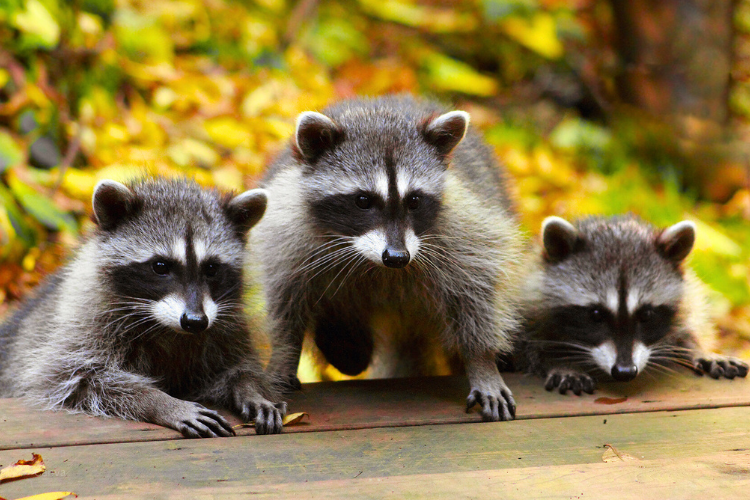Sharing your house with a wild animal sounds quirky until the parasites, lawsuits, and chaos show up.

Keeping a raccoon might sound edgy and alternative until you realize you’ve essentially moved in with a trash panda that doesn’t believe in boundaries. People post TikToks of raccoons eating cereal and wearing hoodies like it’s a vibe, but behind the scenes is a bacteria bomb with claws. Cute isn’t the same as safe, and once they mark their turf, it’s your deposit and dignity on the line.
1. Raccoons are major carriers of Baylisascaris and it can wreck your nervous system.

Raccoons often carry a parasite called Baylisascaris procyonis, which is a roundworm that sheds microscopic eggs in their feces, as discovered by the CDC. Those eggs can survive for years in your carpet or yard and, if accidentally ingested by a human, they can migrate to the brain, eyes, or spinal cord. This isn’t a mild infection. It can cause permanent neurological damage, vision loss, and in rare cases, death. You won’t even know exposure happened until symptoms hit, and by then, the damage is often irreversible. No filter or leash can change that level of risk.
2. Rabies isn’t a rumor—it’s a real and recurring problem with raccoons.

According to the USDA Wildlife Services, raccoons are one of the top carriers of rabies in the United States. Even if they’re acting sweet and bottle-fed, that doesn’t mean they’re safe. Rabies doesn’t always show up with foaming and aggression. Sometimes, infected animals seem unusually tame or sleepy. Once symptoms appear in humans, the disease is almost always fatal. And raccoons can carry it without warning for weeks. One scratch, one bite, or one brush against a mucous membrane can trigger exposure. There’s no such thing as a rabies-free raccoon without repeated, supervised lab testing.
3. Their urine carries leptospirosis, which spreads through tiny cracks in your skin.

Raccoons can shed leptospira bacteria in their urine, contaminating water, soil, or any surface they frequent. As stated by the World Health Organization, the bacteria can infect humans through cuts, abrasions, or even intact skin if it stays wet long enough. Symptoms can mimic the flu at first but can lead to liver damage, kidney failure, or meningitis if untreated. Since raccoons aren’t litter-trained, they’ll urinate in hidden corners, under furniture, or inside vents, making it nearly impossible to sanitize effectively. The risks stack up fast, especially if you live in an apartment or have other pets.
4. Their behavior is one raccoon tantrum away from disaster.

Domesticated isn’t the same thing as tame. Raccoons raised in homes often remain unpredictable because they were never genetically wired for human cohabitation. They can throw full-blown fits when overstimulated, bored, or just because they feel like it. That can mean biting, scratching, flipping dishes, and shredding couch cushions like they’re excavating a forest floor. Once they reach sexual maturity, even the sweetest raccoons turn territorial, and many become downright aggressive. Unlike dogs or cats, you can’t really train that out. They’re wild animals who never signed up for the roommate life.
5. Raccoons do not understand windows or gravity and they will test both.

People assume raccoons are nimble and clever enough to stay safe indoors. They’re half right. They are clever. But they also have no spatial awareness. They’ll leap off shelves, climb cabinets with zero exit strategy, and launch themselves at windows thinking there’s more tree on the other side. Broken bones, shattered glass, and destroyed decor come with the territory. If you’re not ready to raccoon-proof like you’re toddler-proofing a treehouse, accidents happen fast. Their curiosity is constant and their survival instincts are oddly selective.
6. They will destroy your walls to explore whatever they think is behind them.

Raccoons dig. It’s in their DNA. Once they’re bored—and boredom hits fast—they’ll claw through drywall, vents, insulation, or furniture just to find a bug, a sound, or nothing at all. They’ll rip apart vents to chase air movement or tear into ceilings because they smell a spider. Their hands are dexterous enough to open drawers but destructive enough to leave holes in places you can’t afford to fix. It’s not malicious. They’re just built for chaos and your house happens to be the new forest floor.
7. You’re probably violating a state or federal law just by owning one.

In most of the United States, it is either illegal or heavily restricted to keep a raccoon as a pet. Some states allow it with permits, but most classify them as wildlife and ban them for public health reasons. Even if you think your setup is safe, authorities don’t agree. If animal control finds out—or worse, if someone reports a bite—your raccoon can be seized and euthanized, no exceptions. Legal trouble doesn’t always wait for you to Google the regulations. It shows up when things go wrong.
8. They will never actually bond with you like a dog or cat.

Raccoons can recognize faces and tolerate affection, but they don’t form lasting loyalty the way domesticated animals do. The trust is shallow, conditional, and breaks easily with age or hormones. Many people assume a hand-fed baby raccoon will stay sweet. The truth is, most get distant and even hostile as they mature. Some will flee at the first open door. Others will stay and act like you’re just another appliance that sometimes gives snacks. You’re not a friend. You’re a mildly useful coworker in their eyes, and they’ll forget you the moment they get bored.
